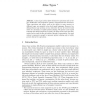98 search results - page 17 / 20 » Object co-location and memory reuse for Java programs |
154
Voted
PPOPP
2003
ACM
15 years 7 months ago
2003
ACM
A design pattern is a mechanism for encapsulating the knowledge of experienced designers into a re-usable artifact. Parallel design patterns reflect commonly occurring parallel co...
114
click to vote
ESOP
2000
Springer
15 years 6 months ago
2000
Springer
Abstract. Linear type systems allow destructive operations such as object deallocation and imperative updates of functional data structures. These operations and others, such as th...
134
click to vote
ISSTA
2004
ACM
15 years 7 months ago
2004
ACM
Object oriented programming promotes reuse of classes in multiple contexts. Thus, a class is designed and implemented with several usage scenarios in mind, some of which possibly ...
126
click to vote
EUROPAR
2008
Springer
15 years 4 months ago
2008
Springer
Abstract. Understanding program behavior is at the foundation of program optimization. Techniques for automatic recognition of program constructs characterize the behavior of code ...
130
Voted
IWMM
2009
Springer
15 years 9 months ago
2009
Springer
The peak heap consumption of a program is the maximum size of the live data on the heap during the execution of the program, i.e., the minimum amount of heap space needed to run t...

